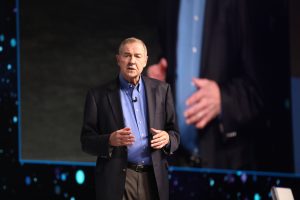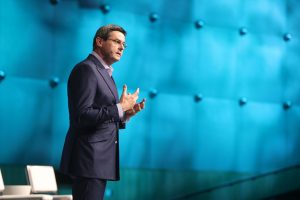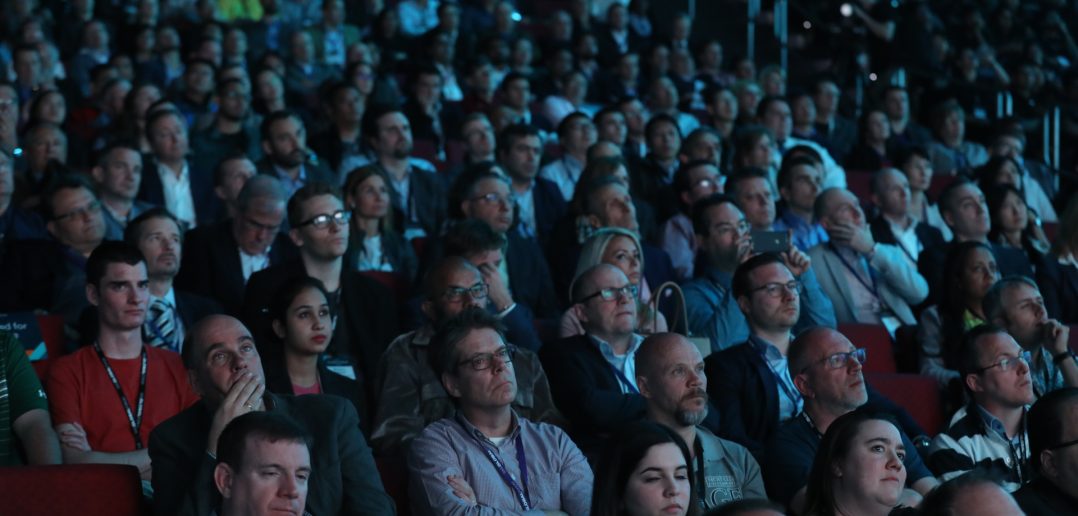In a room filled with nearly 5,000 attendees, this year’s opening session reminded us all that innovation will always be possible and new discoveries can be uncovered when curious minds boldly ask, “What if?”
Innovation is a two-way street

SAS CEO Jim Goodnight was the first executive to take the stage Sunday night. Goodnight explained that SAS has been running at lighting speed since last year's conference in Orlando.
"Our innovation engine has been revving at full speed," said Goodnight, "but innovation for SAS is a two-way street. You spark our desire to make better software, and it's our responsibility to equip you to go out and transform the world."
Together, SAS employees, partners and users, are capitalizing on the power of analytics to make breakthroughs that will change the world as we know it. With the curious minds of SAS innovators working to push the boundaries on what is possible, one day every organization will be designed to work analytically. The old constraints and limitations that once stifled what could be known, what could be explored or what could be discovered, will fall away. The intelligence that comes from this new world of data will transform lives and will allow us all to race toward a bigger and bolder future, together.
"SAS can tackle the really big problems in one seamless flow," said Goodnight. There are no barriers anymore. And that's great news for the serious challenges facing our society today."
Watch Goodnight's full talk below, or visit the SAS Global Forum virtual event page to see more live coverage.
Transforming lives, continuous adaptation and the opportunities to come
Mathematics expressed through software. That's SAS. Decisions based on gut feelings and tedious, error-prone hand calculations have now been replaced with intuition and reliable algorithms executed by machines. Pick the label you want to use – analytics, machine learning, automation or artificial intelligence – the origin of those technologies was there in 1976, when SAS first opened its doors and put mathematics to work in a way no one had ever done before.

So, while the term artificial intelligence may seem like a new tech trend for the rest of the world, it’s nothing new for SAS. Artificial intelligence is merely a continuation of the advanced analytics SAS has been working on for years. The foundational elements of artificial intelligence – machine learning, deep learning and neural networks – are models, they just have lots and lots of parameters in place.
"SAS was founded on the belief that analytics is transformative technology," said Executive Vice President, Chief Operating Officer and Chief Technology Officer Oliver Schabenberger.
Fighting fraud, creating safer drugs, protecting wildlife, improving healthcare and ensuring accurate and fair pricing – it all comes back to transforming lives and making our world a better place. Our belief in the transformative power of analytics sits at the core of who we are as company. Schabenberger used his time on stage to remind attendees of the fundamental beliefs that reside at the heart of SAS and drive every decision the company makes:
- We believe that curiosity is at the heart of human progress and that we can improve lives through analytics.
- We believe we can transform a world of data into a world of intelligence because of analytics.
- We believe we can empower and inspire you to do great things in data because we are the world’s most trusted analytics.
Those statements were more than powerful words strung together for a presentation. They represent our inner compass, why we opened our doors 42 years ago, and why we still exist (and lead) in analytics today.
Schabenberger continued his talk by exploring the analytics economy, one that requires increasingly intelligent and automated systems. This new economy forces us all to find new ways to build, manage and control intelligent systems. But to do that, our mindset must shift to one of continuous learning.
"Life is no longer divided into a period of learning and a period of working," said Schabenberger. "That model is obsolete and forces us all (individuals and businesses) to grow if we want to avoid disruption or displacement." And while automation of jobs will be inevitable in the coming decades, Schabenberger put the fears of displacement to rest, explaining that the era of automation will create new jobs – jobs we've never seen, considered or thought of in the past. This new era should be one filled with hope and optimism because there will be endless opportunities for all.
"With data and analytics in hands of lifelong learners, the power to do good is unlimited," said Schabenberger.

